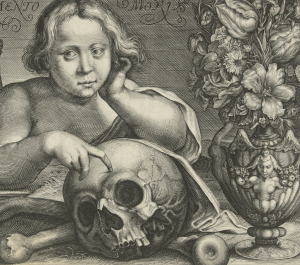
Kind met doodshoofd (Vanitas), Simon van de Passe, after Crispijn van de Passe (I), 1612
The last days of dear old winter. Much of this year spent in a haze, reading little but well.
I read Yiyun Li’s Dear Friend, from My Life I Write to You in Your Life, a remarkably fine and wise contemplation of self-knowledge and the abyss of depression. Much of this explores the reduction of the human. The book also echoed a sentence I once transcribed from an attempt to read Hegel: This release of itself from the form of its own self is the highest freedom. That reading of Hegel resisted coherence, but that sentence, a coalescence of poetry and philosophy cut so deep I have transferred it from notebook to notebook.
The Vast Extent by Lavinia Greenlaw plays with light and attentiveness. I entered the aura of the text and did not want to leave. It is an extraordinary work that slips away from genre and definition. It works on the edge of autobiography but never quite removes the mask.
Spinoza looms over this year’s reading following my fascinated scrutiny of George Eliot’s translation of Ethics. I’m slowly reading Eliot’s Journals. Unlike Woolf’s diaries, these are economic, writing that subtracts ornament and distraction, but remains somehow rich and expressive.




